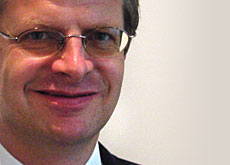More foreigners move into Swiss boardrooms

Foreigners are grabbing more of the top jobs at Switzerland's biggest firms - one in six top managers is now thought to be non-Swiss.
Critics say Anglo-Saxons in particular have changed the culture at Swiss firms leading to more uncertainty and discontent among employees.
Foreign bosses are nothing new to Switzerland – indeed Nestlé and Roche are headed by Austrians Peter Brabeck and Franz Hümer.
But the number of top executives without a Swiss passport has increased markedly this year, particularly in the beleaguered banking and insurance sectors.
In recent months, Britons and Americans have elbowed aside their Swiss counterparts at Swiss Re, Credit Suisse and Zurich Financial Services, as the rout of managers continues amid the global economic downturn.
Zurich Financial Services’ Rolf Hüppi handed over the reigns to an American, James Schiro; Credit Suisse chairman and CEO, Lukas Mühlemann was succeeded by two CEOs, one of whom, John Mack, is an American; and Briton John Coomber is taking over at Swiss Re from Walter Kielholz, who is moving to Credit Suisse as chairman.
UBS has Swiss in the top jobs, but only after CEO Peter Wuffli took over from Briton, Luqman Arnold, earlier this year.
Headhunters such as Toni Nadig from DBM in Zurich say this year reinforced a growing trend towards more recruitment overseas, particularly from the Anglo-Saxon world, but also from Germany and Asia.
Mentality
Nadig says foreign bosses have one key advantage over their Swiss counterparts: namely their knowledge and familiarity with the country’s main export markets. “They understand the mentality and have the necessary know-how to deal with those markets.”
For Nadig, it is clear that the best person to negotiate successfully with Americans in an American. He says a native also knows which products have the best chances of success in their home market – invaluable knowledge to an export-oriented economy such as Switzerland’s.
Another reason is a shortage of homegrown talent. And this extends beyond big corporations and universities to workers lower down in the pecking order. Without foreigners, who make up around 20 per cent of Switzerland’s population, the economy simply wouldn’t function, says Nadig.
The reaction of employees, whether Swiss or foreign, to more foreign bosses is rather less positive.
Mary-France Goy of the Swiss banking personnel federation says conditions for employees in the sector have worsened considerably in recent years.
“Today, much more is demanded of workers,” she says, adding that their income is not increasing proportionately.
Different culture
For Goy, Anglo-Saxon managers especially have brought a different culture to the Swiss workplace, and one which is characterised by change. Strategies and targets are continually being redefined, she says, leading to more uncertainty and discontent among employees.
Goy admits that the banking sector, both inside and outside Switzerland, is going through a period of major upheaval. But in her view Swiss managers tend to try and limit uncertainty by implementing change more slowly and continuously.
An employee in banking gets a new boss every eight months, she says, and the comings and goings on the upper floors is set to continue well into 2003.
The Swiss Trades Union Federation agrees with Goy that change and uncertainty are the order of the day. But spokesman, Ewald Ackermann, is less convinced that it is down to more foreign bosses.
He says the culture in Swiss enterprises has clearly changed significantly as a result of globalisation and Swiss bosses are driving the process – or at least trying to keep up with it – in just the same way as their overseas counterparts.
swissinfo with agencies
The number of top executives without a Swiss passport has increased markedly, particularly in the beleaguered banking and insurance sectors.
Headhunters say foreign bosses have one key advantage over their Swiss counterparts: their knowledge and familiarity with the country’s main export markets.
Critics say Anglo-Saxon managers have brought a different culture to the Swiss workplace leading to more uncertainty and discontent among employees.
But they are divided over whether this is down to more foreign bosses or the changes wrought by globalisation in general.

In compliance with the JTI standards
More: SWI swissinfo.ch certified by the Journalism Trust Initiative













You can find an overview of ongoing debates with our journalists here . Please join us!
If you want to start a conversation about a topic raised in this article or want to report factual errors, email us at english@swissinfo.ch.